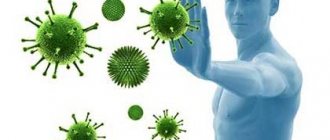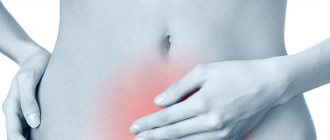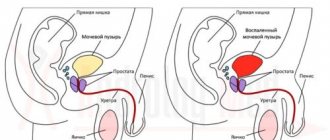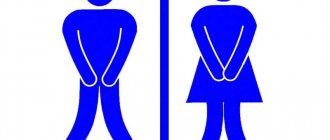What methods exist to prevent the disease?
Conventionally, all methods of preventing recurrence of cystitis can be divided into three categories:
- drug prevention;
- behavioral, non-drug methods;
- other preventive methods (traditional medicine recipes).
All of the above methods can be harmoniously combined with each other if the doctor does not identify any contraindications.
Changing behavioral principles is the easiest but most effective way to minimize the likelihood of exacerbation of the disease. It is necessary to adhere to it throughout your life for any type of cystitis.
The use of medications for the purpose of prevention often involves long-term use.
You should also consult a specialist about the use of other preventive methods.
Unfortunately, none of the prevention methods can provide a 100% guarantee of no relapses. The “gold” standard in terms of effectiveness can only be considered taking low doses of antibiotics. This method has a high level of evidence for its effectiveness, but it is not entirely safe.
Preparations based on herbal raw materials have a minimal number of side effects, but there have been practically no large-scale studies of their effectiveness.
Non-drug methods to prevent disease
The main reason for the activation of bacteria and viruses is hypothermia. The fact is that when the temperature drops, blood circulation is disrupted and this provokes the development of inflammation. It is very important to avoid hypothermia: wear waterproof shoes and dress appropriately for the weather. Many people insulate themselves only in winter and autumn, but in summer cystitis can also appear after walking in the rain or swimming in a body of water with a cold current.
Cystitis often develops against the background of a decrease in the body’s defenses. Daily walks, hardening and proper nutrition (exclude canned food, chips, etc.) will help improve immunity.
It is also worth considering the treatment of chronic ailments. It is especially important to pay attention to the condition of the oral cavity, since even caries can provoke the appearance of cystitis.
Every day you need to drink at least one and a half liters of water. This will change the composition of urine and make it unsuitable for the life of pathogenic microorganisms. It is better if the liquid is slightly acidified (with the addition of cranberries or lingonberries). Then inflammation of the bladder mucosa will most likely be avoided.
Among other things, it is worth:
- monitor compliance with the rules of intimate hygiene;
- use pads rather than tampons;
- avoid overfilling the bladder;
- Avoid tight clothing (especially wearing thongs and stretch jeans).
Causes and risk factors
Cystitis is usually caused by one or another bacterial infection. In more rare cases, this sore occurs due to damage or irritation of the bladder.
Sometimes cystitis can occur due to chronic constipation caused by poor diet. It can also be triggered by a sedentary lifestyle.
There are risk factors that can trigger the development of infection in the body. They must be taken into account.
In short, cystitis is a very insidious disease from which no one is immune. It can be triggered by a weakened immune system, infections, age and lifestyle, even a sudden surge of unhealthy emotional states.
However, in order to understand the true causes of the disease, it will be necessary to conduct an ultrasound examination of the bladder, make a smear from the urethra and donate urine for bacterial culture. This is the only way to get the full picture.
According to the general opinion of doctors, the cause of the disease is bacteria living in the intestines or on the skin when, for some reason, they manage to penetrate the bladder. Once in a favorable environment, they multiply at lightning speed.
Pathogenic microorganisms can enter the bladder through:
- diaphragm for contraception;
- tampon or urinary catheter;
- particles of feces left on the genitals after using the toilet;
- sexual contact.
A woman’s urinary tract is designed in such a way that it is actually a gateway for pathogenic infection.
The following can give impetus to the development of this insidious disease:
- menopause;
- pregnancy;
- diabetes;
- a number of medical procedures that can be quite traumatic;
- chemical irritants in soap or bubble bath;
- hypothermia.
And there can be a lot of reasons for the disease: a partner who despises washing every day and does not disdain extraneous sexual contacts, a hospital infection, a temporary decrease in immunity after hospital procedures, and so on.
Unfortunately, most of the female population begins to listen to their body too late, ignoring warnings.
Methods of drug prevention
The use of medications to prevent cystitis has certain advantages compared to other methods:
- The pharmacodynamics and pharmacokinetics of drugs, the frequency of side effects have been carefully studied (in addition to herbal preparations).
- Most medications have an evidence base for their effectiveness based on multiple studies.
- There are clear application diagrams and instructions.
Drug methods for preventing cystitis include:
- antibacterial drugs;
- herbal remedies;
- immunotherapy drugs;
- probiotics;
- bubble instillation;
- bacteriophages.
Antibacterial methods
Prevention of cystitis in women using low doses of antibacterial drugs has sufficient justification in official medicine.
Research results have shown that in patients using antibiotics, the frequency of the disease is reduced by 8 times.
It is important to note that such prevention should be carried out under the supervision of a doctor. Based on urine tests, the specialist will prescribe the appropriate type of antibiotics. The most popular drugs for the prevention of cystitis are:
Immunotropic drugs
When the bladder is inflamed, there is always a violation of the immune system, so prevention methods should be aimed at restoring the body's defenses. For this purpose, immunotropic drugs are used. They stimulate the production of antibodies that block the occurrence of infectious diseases. This type of prevention has a minimal number of side effects.
Separately, it is worth noting the immunotropic drug Uro-Vaxom. It contains antigens from eighteen types of Escherichia coli, which are often the cause of recurring cystitis. The use of this medication stimulates general and local immunity.
The effects of Uro-Vaxom have been studied for several years, and more than a million patients participated in the study. The course of taking the drug is three months.
Phytotherapy
Medicines based on herbal components are absolutely safe (with the exception of individual intolerance to some herbs), so they can be taken for a long time.
The two most effective herbal remedies:
- Phytolysin. This multicomponent medicine is recommended mainly for patients in whom cystitis is provoked by mechanical injury to the urinary tract. Available in the form of a paste for preparing a suspension.
- Canephron. Its advantage is that pathogenic bacteria cannot develop resistance to it. For this reason, even with long-term use, Canephron will act with high efficiency. This is the only drug from the herbal category that is allowed to be used by pregnant women. Available in dragee or liquid form.
Probiotics
Probiotics are preparations with a high content of microorganisms beneficial to humans that help restore intestinal microflora, the condition of which determines the risk of cystitis. It is especially useful to use medications containing lactobacilli. Let's consider popular probiotics recommended for the prevention of cystitis:
- Acipol . The drug contains live lactobacilli and kefir protein polysaccharides. Prevents the activity of pathogenic bacteria, some of which lead to the development of cystitis. It also normalizes the state of intestinal microflora. The product has no side effects or contraindications.
- Rioflora Balance . It is a source of 9 varieties of bifidobacteria and lactobacilli, which regulate the balance of intestinal microflora. Contraindications for use are pregnancy and the presence of pancreatitis.
- Bifiform . The product capsules contain enterococci and bifidobacteria, which normalize the intestinal microflora and improve immunity. Bifiform is prohibited in case of lactose deficiency.
Prevention with medications
Any cystitis is microbial in nature, so treatment and prevention are aimed specifically at the impact of microbial flora.
Drugs for the prevention of cystitis have not only an antimicrobial effect, but also a diuretic.
The most optimal and safe drug for preventing cystitis is Canephron. Medicine based on natural ingredients, without synthetics.
This allows you to take Canephron for a long time, especially with frequent relapses of chronic cystitis. The important thing about the drug is that microbes do not develop immunity to it.
You can replace it with Uroprofit or Monurel. Monurel is not a medicinal drug; it is classified as a dietary supplement. It can be taken at any time, combined with other medications. It is based on cranberry extract and a large amount of vitamin C. Monurel has a particularly strong effect on the female body, where microbes are more dangerous.
For men there is a special product that has not only an antimicrobial effect: Beaver Jet. This is an extract that is extracted from the internal organs of beavers. The beaver jet is usually made strictly to order. The expensive price is due to the difficulty of obtaining the main component.
The infusion is capable of:
- restore potency;
- treat the prostate;
- serve for the treatment and prevention of cystitis, even in chronic form;
- treat neurological and gynecological diseases.
Side effect – high sexual excitability, duration of sexual intercourse. In case of serious cardiovascular problems, it may be prohibited, so the opinion of the treating urologist is required before use.
You need to understand that prevention is effective with frequent signs of exacerbation only at the very beginning of the exacerbation. If the passage of urine is disrupted, the temperature, even slight, requires full treatment.
Intravesical instillations
Instillation is a method of delivering medications directly into the bladder. It is an actively developing area in the prevention of cystitis, which is still relevant only for certain categories of patients (for example, for those suffering from radiation cystitis).
Advantages of intravesical instillations:
- Medicinal substances actively penetrate into the focus of the inflammatory process and immediately begin to act, concentrating on the problem area.
- Discomfort during the procedure is minimal.
- Instillation is considered the most gentle way to deliver antibacterial, anti-inflammatory and other compounds into the bladder.
This procedure is not recommended if contraindications are identified, which include injury to bladder tissue, acute forms of infectious and inflammatory pathologies, and severe narrowing of the urethra.
Nutrition
To reduce the risk of cystitis, you need to minimize the impact of harmful foods on the bladder walls. These include salty, spicy, pickled dishes that irritate the genitourinary system.
Drinking regime
Not only nutrition, but also drinking regimen is important in the prevention of cystitis. Drinking a large amount of water (at least 2-2.5 liters per day) in case of bladder diseases promotes active kidney function and the rapid removal of bacterial microflora harmful to the body from the genitourinary system.
Other methods of preventing pathology
Dietary supplements and folk recipes can be combined into this category, since there is practically no serious evidence of their effectiveness. It is best to use them in combination with the above methods of prevention.
These are compositions of substances for direct intake with food. Official medicine does not have data on their pharmacodynamics and pharmacokinetics due to the lack of a clear amount of substances in the drug and a specific formula. However, the prevention of cystitis with dietary supplements is gaining momentum.
The biologically active additive “Cistel” has many positive reviews, which binds pathogenic bacteria and removes them from the body naturally. The prophylactic course lasts 2-4 weeks, but it should be repeated about three times a year.
Herbal infusions
Helps prevent many bladder pathologies. Chamomile petals, bear's ears, St. John's wort, knotweed, lingonberry, and thyme (creeping thyme) are well suited for preparing infusions.
You can also purchase ready-made urological preparations in the pharmacy in the form of a mixture of rhizomes, herbs, leaves and fruits of medicinal plants, or as tea (in bags or loose).
For example, the herbal mixture “Brusniver” (lingonberry leaves, string, St. John’s wort, rose hips) and “Fitonephrol” (calendula flowers, dill seeds, bear ears, eleutheroccus, mint).
Herbal baths
They help prevent infection from entering the bladder during the onset of a cold. Pine and spruce decoction is especially suitable for a warm bath. It is necessary to chop the needles and cones. Then pour 2.5 liters of hot water and place on a lit burner. Cook for half an hour. Then let it sit for another hour. Strain the resulting infusion and pour it into a bathtub filled with water.
For example, horsetail contains small crystals of silicon. Their irritating effects can lead to bleeding from broken capillaries.
Folk remedies
In addition to medications, folk remedies play an important role in the prevention of the disease, which help eliminate spasms and inflammation of the bladder and have diuretic properties. Despite all their effectiveness for prevention, herbal remedies have no contraindications or side effects.
An infusion of aspen buds is drunk throughout the day to prevent the disease.
Yarrow infusion is drunk for treatment and prevention - 1-2 weeks.
A decoction of rosehip roots is drunk 0.5 cups in the morning and evening for a long time.
Aspen infusion
An infusion of aspen buds (2 tsp per 2 cups of boiling water) is kept for 15 minutes and drunk throughout the day to prevent the disease.
Yarrow infusion
2 tsp. crushed yarrow herb, pour 200 ml of boiling water, leave for 1 hour and filter. The entire volume of the drug is drunk in 4 doses per day. The course of treatment and prevention is 1-2 weeks.
Rosehip root decoction
4 tbsp. l. crushed roots are poured into 0.5 liters of boiling water and simmered in a water bath for 20 minutes. Cool and drink 0.5 cups of the product in the morning and evening for a long time.
Herbal infusions
Herbal teas for the prevention of cystitis include herbs such as corn silk, lingonberry leaf, chamomile, dill seeds, bearberry, horsetail, thyme, St. John's wort.
They can be used both for the preparation of infusions and decoctions for oral administration, and for baths.
Baths
A warm sitz bath with herbs has an anti-inflammatory and antiseptic effect, helps relieve pain and cramps during exacerbation of pathology. For prevention, chamomile, sage, calendula, and birch leaves are used. They can be used either individually or in a mixture.
The duration of the procedure cannot exceed 15-20 minutes, and the water temperature should be comfortable. It is recommended to take preventive baths for at least 1 week.
A number of preventive measures
Prevention of cystitis, as well as its treatment, necessarily requires an integrated approach. General preventive measures for the disease, regardless of its origin, include:
- maintaining personal hygiene;
- proper nutrition;
- therapeutic exercises;
- taking herbal preparations;
- carrying out immunotherapy;
- undergoing physical therapy.
An integrated approach to the prevention of cystitis will help reduce the number of relapses in chronic cases and minimize their occurrence.
Maintaining personal hygiene
It is important for women not only to regularly observe personal hygiene measures, but also to do it correctly using special products. For the washing procedure, it is recommended to use a special soap for intimate hygiene with a neutral pH, which does not disturb the natural microflora of the genitourinary organs.
It is necessary to wash from front to back, that is, starting from the pubis to the anus. This measure will help prevent the penetration of E. coli, which is a natural inhabitant of the intestines, from the anus into the urethra.
During the period when the likelihood of exacerbation of cystitis increases several times (May-June, October-November), it is recommended to use decoctions based on chamomile or calendula, which have antiseptic and anti-inflammatory properties, from time to time for the washing procedure.
A number of hygiene measures should be taken before and after sexual intercourse. Also, for women suffering from frequent relapses, combining anal and vaginal sex is highly discouraged due to the high risk of exacerbation after sexual intercourse. An additional preventative measure is to empty the bladder before and after coitus.
Nutritional Features
Women who are predisposed to frequent exacerbations of cystitis should not only exclude certain categories of foods from their diet, but also eat a balanced diet. The daily menu should be as varied as possible so that the body can receive all the necessary nutrients and beneficial substances.
During the period of remission, the female body especially needs vitamins E, A and C. Foods such as brown rice, white cabbage, liver, beans, chicken eggs, carrots, strawberries, raspberries, watermelon are rich in them. There is also a category of plant foods that contain many beneficial vitamins, but they are not recommended for use by patients prone to frequent exacerbations of the disease. These include lemon, horseradish, tomatoes, garlic, and onions. These foods contain large amounts of acids and other substances that irritate the protective epithelium of the bladder. Their excessive consumption can provoke a relapse of the disease.
Estrogens play an important role in strengthening the protective functions of the bladder. Their deficiency inevitably leads to a decrease in local immunity and disruption of organ function. Therefore, women, especially those over 40 years of age, must include dairy, fermented milk products (milk, natural yogurt, kefir, cottage cheese, hard cheese), flaxseed oil, soy and legumes in their diet. They promote the natural production of essential hormones in the body, helping to maintain women's health.
Non-drug prevention
To exclude the occurrence of infection, it is necessary not only to use medications and folk remedies, but also to carefully monitor the cleanliness of the body, clothing and temperature.
Hygiene
Bacteria can enter the genitourinary system as a result of insufficient cleanliness of underwear or irregular washing. Therefore, it is necessary to shower daily, as well as change swimming trunks and pads. This is especially true during menstruation, when bacteria easily enter the bladder from the genitals.
It is recommended to wash from front to back to prevent E. coli, which often causes cystitis, from entering the vagina.
Personal hygiene also includes timely emptying of the bladder, since prolonged overflow can lead to thinning of the walls of the organ and weaken resistance to infections.
The right clothes
The disease can be provoked by wearing too tight underwear, thongs, or tight jeans. In this case, blood circulation in the pelvic organs and lower extremities is disrupted, blood stagnation occurs and, as a result, an inflammatory process occurs.
Therefore, panties and swimming trunks, as well as underwear, should not be too tight, squeezing the crotch.
Temperature
Often, inflammation in the urinary system is promoted by hypothermia. If you wear inappropriate clothes in autumn and winter, for example, thin tights or a short skirt, then the tissues of the perineum experience great stress due to spasm of the blood vessels of the pelvis and the cessation of normal nutrition to the organs.
Against the background of hypothermia, immunity decreases and the inflammatory process begins.
Cystitis can occur while swimming in water with a low temperature, especially if a woman stays in the pond for a long time. A wet swimsuit also contributes to hypothermia of the pelvic organs.
It is possible to get an inflammation of the bladder when sitting on a cold surface. Therefore, effective prevention should include maintaining temperature conditions and avoiding hypothermia.
Physical exercise
Thanks to physical activity, you can remove toxic substances from the body, stop the inflammatory process, eliminate blood stagnation in the pelvic organs, and speed up the flow of nutrients into the body.
A doctor or fitness trainer will help you choose the optimal complex.
Prevention of bacterial acute cystitis
Most often, cystitis is of a bacterial nature, which requires the use of antibiotics. Drugs in this category can be used not only for therapeutic purposes, but also for prophylactic purposes. That is why most patients are interested in the question of how to prevent cystitis at an early stage with the help of antibacterial agents.
For the purpose of prevention, women suffering from frequent relapses are advised to take drugs based on fosfomycin (Monural, Phosphoral, Uronormin F). The antibiotic is taken in a dosage of 3 g every 10 days for six months. To prevent the development of postcoital cystitis, drink the powder diluted with water once after sexual intercourse.
An equally important role in prevention is played by adherence to personal hygiene measures, physical exercise, avoidance of hypothermia, as well as good nutrition. Such activities will help increase both general and local protective functions of the body.
Maintaining immunity
If your cystitis often recurs, it’s time to think about strengthening your immune system. The use of modern immunotropic drugs reduces the frequency of relapses by at least a third.
Interferon-type drugs, for example Genferon, are suitable. The doctor may recommend using Polyoxidonium and Glutoxim intramuscularly.
Nature also offers us a unique remedy for supporting immunity - cranberries. It is an invaluable source of vitamin C and has an anti-inflammatory effect. Please note that the extract of this berry is included in most herbal remedies used to combat cystitis.
For prevention, cranberries should be consumed in courses of 3 weeks several times a year.
You need to take a tablespoon of berries, fresh or frozen, mash them, pour a glass of boiling water, leave for 20 minutes and drink on an empty stomach. You can add honey.
It is also recommended to use cranberry juice; it should be diluted with water and drunk several times a day.
Of course, it is necessary to stimulate the immune system not only with various drugs, but also with a healthy lifestyle. In order for the body not to be susceptible to infections, you need to sleep fully 8 hours a day, eat right, move enough, and do not forget about physical exercise.
Pay attention to the functioning of the intestines, because the functioning of the immune system directly depends on it. Fight constipation and various manifestations of dysbiosis.
Prevention of non-infectious cystitis
Chronic cystitis with a non-infectious etiology is called interstitial. Women during and after menopause are more susceptible to the disease. This is due to the fact that the ovaries stop producing estrogen hormones in the required quantities. They are responsible for the production of hyaluronic acid and other substances that form the protective epithelium of the bladder, which prevents the aggressive effects of urine on tissues. The loose structure of the mucous membrane leads to the fact that urine begins to corrode the walls of the urinary organ, provoking an inflammatory process.
It is possible to prevent further development of the pathological process and restore the damaged structure of the epithelium with the help of synthetic hormones. For this purpose, the patient is prescribed hormone therapy in the form of drugs such as Ovestin suppositories and Ornion cream.
Those suffering from this form of the disease should completely exclude lemon, coffee, garlic, spicy seasonings, fried, smoked and alcohol from their diet. They contain components that have an aggressive effect on the mucous membrane of the urinary organ and provoke frequent relapses.
For this form of bladder inflammation, therapeutic exercises and physiotherapy are also indicated.
To prevent the disease, in some cases it is recommended to use folk remedies in the form of fruit drinks and herbal decoctions. In acute cases and during remission, you can drink drinks based on cranberries, bearberry, etc.
Causes of cystitis
In fact, the disease cystitis is a developing inflammatory process that occurs in the mucous membrane of the bladder. The disease affects the entire urinary system, significantly reducing the functionality and activity of the bladder and changing the composition of urine.
Depending on the causes of the disease, cystitis can be acute or chronic. Unfortunately, it is almost impossible to prevent the occurrence of the acute form, but a number of rules and recommendations will help to successfully prevent chronic inflammation.
The causes of acute cystitis develop on the basis of exogenous and endogenous factors.
Exogenous causes include:
- Pathogenic microorganisms;
- Burns and radiation;
- The presence of toxic, poisonous substances;
- Allergist agents.
Endogenous factors are represented by the following diseases:
- Prostate adenoma;
- Urolithiasis disease;
- Urinary tract infections;
- Neoplasms;
- Violations of the integrity of the bladder and mucous membrane.
With unfavorable microflora and reduced immunity, previously inactive viruses and bacteria begin to quickly grow and multiply. This is facilitated by hypothermia, lack of microelements and vitamins, stress, etc.
The main symptoms of bladder inflammation include the following factors:
- Sharp pain when urinating;
- Urine changes color;
- Unpleasant urine odor;
- Pain in the lower back and lower abdomen.
Inflammation of the bladder is accompanied by an increase in the urge to go to the toilet, and urination is not always successful (sometimes urine is not released).
Prevention of specific cystitis
The development of specific cystitis is preceded by sexually transmitted sexually transmitted diseases such as chlamydia, gonorrhea, trichomoniasis, etc. The insidiousness of STDs is that they often occur with symptoms similar to urethritis, cystitis and vaginal candidiasis. Not wanting to see a doctor, many women begin to self-medicate, causing chronicity of the venereal disease and its complications. This is fundamentally wrong. Only timely diagnosis and treatment of STDs will help prevent the development of the disease.
Infection with sexually transmitted infections can be prevented through barrier contraception and the exclusion of promiscuity.
Prevention after cystitis
It is impossible to completely eliminate the risk of relapse, but there is a chance to significantly reduce the likelihood of a relapse. There is no universal remedy that would help avoid frequent episodes of the disease, so you should immediately follow a set of preventive measures, namely:
- active lifestyle;
- compliance with the drinking regime;
- proper and balanced nutrition;
- taking vitamin complexes;
- refusal of promiscuity;
- avoiding hypothermia;
- proper hygienic care of the genitourinary organs.
Diet against cystitis
The body has its own internal clock according to which its organs operate. The working day of the kidneys ends approximately after lunch, then they switch to a lighter mode. This means that loading the body after this time will put excessive stress on the kidneys. If the kidneys constantly work in active mode, exacerbations and inflammations will be regular.
In case of chronic cystitis, the following foods are completely eliminated from the diet:
- spicy and salty dishes;
- a minimum of smoked products and preservatives (during the period of stable remission);
- minimum salt;
- river fish in any form.
A diet rich in dairy products and fresh vegetables is ideal. In any form of cystitis, it is important to ensure increased urine output; this is the only way to wash away the germs. Therefore, you need to drink more natural juices. It is very useful and even necessary to drink rose hips, cranberry juice and lingonberry compote. Sometimes only they are enough to neutralize even the onset of cystitis.
Prevention of cystitis in women
Preventing cystitis for a woman who has once suffered such a disease is an extremely important task. Representatives of the fair half of humanity do not always manage to avoid cystitis - even if the disease has receded, with the slightest decrease in immunity it will definitely remind itself again. A woman immediately recognizes this insidious disease - problems with urination, pain and general discomfort appear.
Prevention of cystitis in women is important because the acute form of the disease, in the absence of high-quality professional therapy, goes into a more severe stage, and it is no longer possible to get rid of the disease. You can avoid unpleasant situations by regularly visiting your doctor. Taking tests and other preventive measures will also help:
- Using traditional medicine recipes;
- Tablets for the prevention of cystitis prescribed by a doctor;
- Regular procedures to improve the health of the body;
- Quality food.
Since the problem arises as a result of hypothermia and reduced functions of the immune system, the prevention of cystitis in girls will consist of a balanced diet full of vitamins, as well as regular exercise. It is important to pay attention to personal hygiene, not to visit polluted bodies of water, and undergo a routine medical examination in a timely manner.
Prevention of cystitis in women with folk remedies has been practiced for many decades. Women use herbal infusions, compresses, as well as special physical exercises, which quickly relieve the problem.
Use of medicinal plants and herbs for acute cystitis
In case of acute cystitis, it is necessary to drink large amounts of fluid and take diuretics so that the bacteria leave the body along with urine.
During this period, it is worth using medicinal plants and herbs:
- Introduce millet porridge into the menu, as well as take decoctions and infusions based on millet: pour 100 grams of washed cereal into 1000 ml of boiled water, but cooled to a temperature of 70 degrees. Leave for one hour and start drinking the infusion. This portion must be drunk in one day. Every new day is a new portion of the broth. Relieves urinary symptoms well.
- Cranberry and lingonberry juice or juice - acidifies the microflora in the urinary system and prevents the spread of germs. Cranberry tincture should be available to every woman at the time of sudden cystitis: 200 grams of berries and 200 grams of granulated sugar are placed in a jar in layers and poured with 1000 ml of vodka. Infuse for at least 30 calendar days, strain and take 50-100 ml of tincture 3 times a day. Symptoms of acute cystitis disappear in one to a maximum of two days.
- Take herbs with anti-inflammatory properties: chamomile, calendula, wild rosemary, St. John's wort, sage. Also take herbs with diuretic effects: bearberry, thyme, celandine, wormwood, nettle. Quite often, the properties of one plant include a diuretic and anti-inflammatory effect.
Prevention of cystitis in men also consists of proper nutrition, avoiding hypothermia, selective sexual intercourse and hygiene.
Medicines to prevent cystitis in women
Medicines for the prevention of cystitis in women are prescribed if there is a risk of recurrence of the disease. As a rule, herbal medicines that do not have serious contraindications are used to relieve inflammation. Therefore, these medicines are allowed to be used for a long time without harm to health.
In almost any pharmacy, without a doctor’s prescription, you can buy pills for cystitis in women, which will not harm your health and will not create additional discomfort. Today, the prevention and treatment of cystitis is carried out using natural herbal preparations:
At the same time, a drug such as Phytolysin for cystitis is prescribed only if urolithiasis is detected. As a result of the disease, the urinary tract becomes irritated, and inflammation provokes the development of additional diseases.
Also often used, Monural for cystitis is a dietary supplement that is used during exacerbation of an unpleasant disease. Despite the fact that all medications are considered absolutely safe, it is not recommended to use them without a doctor’s prescription. Before using such medications, you should undergo a medical examination and tests.
Treatment
When alternative and traditional medicine does not help in the prevention and treatment of cystitis, they resort to drug treatment:
- The drug "Monural" is designed to combat various types of viral microorganisms and bacteria that can develop in the bladder cavity. The medicine has an anti-inflammatory and analgesic effect, an improvement in the condition can be noticed within 3-4 hours after the start of treatment. The advantage of the drug is that it has almost all contraindications, the only thing is that it is prohibited for use by young children.
- The tableted product "Nolitsin" has antimicrobial and antibacterial effects. The drug is easily excreted from the body; the active substances are not retained in the tissues and are excreted in urine. There are practically no side effects or contraindications. The medicine is allowed for use even during the period of bearing a “new life”, lactation, breastfeeding, but only under the supervision of a doctor.
- Effective tablets "Palin" for cystitis guarantee prompt treatment and high-quality prevention of the disease. The drug is designed to eliminate the development of acute inflammatory diseases, but is not recommended for use by patients suffering from high sensitivity to pipemidic acid. Major side effects include nausea, diarrhea and vomiting.
- The modern antibacterial agent “Norfoxalicin” is effectively used in the fight against cystitis and other inflammatory processes in the body.
- "Furadonin" is proposed to eliminate pathogens in the urinary system. This promotes effective and rapid recovery. Before use, you must consult a doctor; the drug has a number of contraindications: nausea, allergies, vomiting, severe dizziness. With a positive effect, improvements occur already on the 2nd day of treatment.
- “Furagin” is a high-quality medicine that not only fights cystitis pathogens, but also effectively boosts immunity, which significantly increases the chances of recovery. This is an effective antibacterial agent designed to combat infections such as staphylococcus, E. coli, etc. The drug is strictly not recommended for patients with kidney dysfunction and liver disease.
- "Nitroxoline" is the most effective and powerful drug that quickly copes with viruses and bacteria in the genitourinary system. The drug effectively fights not only chronic cystitis, but also the acute form of the disease.
It is always better to prevent the development of the disease. Than to treat it afterwards, so it is worth following the recommendations for the prevention of cystitis.
Prevention of cystitis after intimacy
Prevention of cystitis after intimacy plays an important role in the life of almost every woman, as well as some men. Some women have repeatedly encountered unpleasant sensations that arise after sex, although it is not necessary to have sexually transmitted diseases.
It is possible to prevent cystitis at an early stage; to do this, after the appearance of the primary symptoms of the disease, you must consult a doctor. Otherwise, the disease will remind itself after each sexual intercourse. This is due to the anatomical structure of the body, as well as natural bacteria that cause inflammatory processes. Oddly enough, few people manage to avoid cystitis after intimacy, but some attention to your own body and compliance with certain rules significantly reduce the risks.
Prevention of postcoital cystitis differs little from trying to avoid the disease in other circumstances. Experts recommend eating healthy foods rich in vitamins and maintaining intimate hygiene, including for your partner. Monural for the prevention of cystitis is optimal in case of problems arising after sexual intercourse (PA) - inflammation is relieved quite quickly, immunity is strengthened.
After PA, Furadonin will not be superfluous for cystitis that occurs regularly. The medicine relieves pain and eliminates most unpleasant symptoms. If the disease returns after preventive measures, you must be re-examined by a doctor and take the recommended tests.
Important! You can take Furadonin to prevent cystitis only after consultation with a medical specialist. The same should be done if Phytolysin is chosen for the prevention of cystitis. Despite the absence of side effects and the natural composition of the drugs, it is worth protecting yourself and keeping the treatment under control.
How to prevent cystitis
An important task for a person at any age is to prevent an unpleasant disease. The main problem is that the disease affects not only adults, but also young children. Any hypothermia will make parents wonder what the prevention of cystitis in children .
For a small child, you should follow the same measures as when treating a disease in an adult. You need to avoid hypothermia, maintain health and eat normal food. This is also the prevention of cystitis during pregnancy . The fact is that children and pregnant women are not recommended to take many medications, therefore, if symptoms and discomfort are detected, it is important to go to the hospital.
Experts say that treating cystitis in children is a complex process that involves a set of measures. It is necessary to monitor the baby’s condition, consult a doctor and observe the dynamics of therapy. If necessary measures are not taken, the disease can become chronic.











